Cover
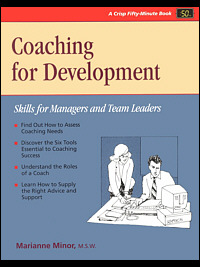
| title | : | Coaching for Development : Skills for Managers and Team Leaders Fifty-Minute Series |
| author | : | Minor, Marianne. |
| publisher | : | Course PTR |
| isbn10 | asin | : | 1560523190 |
| print isbn13 | : | 9781560523192 |
| ebook isbn13 | : | 9781417521890 |
| language | : | English |
| subject | Personnel management, Career development, Employees--Training of. |
| publication date | : | 1995 |
| lcc | : | HF5549.M525 1995eb |
| ddc | : | 658.3/124 |
| subject | : | Personnel management, Career development, Employees--Training of. |
Page ii
CREDITS
Managing Editor: Kathleen Barcos |
Editor: Robert Racine |
Typesetting: ExecuStaff |
Cover Design: Amy Shayne |
Artwork: Ralph Mapson |
All rights reserved. No part of this book may be reproduced or transmitted in any form or by any means now
known or to be invented, electronic or mechanical, including photocopying, recording, or by any information
storage or retrieval system without written permission from the author or publisher, except for the brief inclusion
of quotations in a review.
1995 by Crisp Publications, Inc.

Printed in the United States of America by Von Hoffmann Graphics, Inc.
CrispLearning.com
04 10 9 8 7 6
Library of Congress Catalog Card Number 9567041
Minor, Marianne
Coaching for Development
1-56052-319-0 (Print Edition)
Page iii
LEARNING OBJECTIVES FOR:
COACHING FOR DEVELOPMENT
The objectives for Coaching for Development are listed below. They have been developed to guide you, the reader, to the core issues covered in this book.
Objectives
 1) To explain the role of manager as coach 1) To explain the role of manager as coach
|
 2) To clarify the meaning for five roles of coaches 2) To clarify the meaning for five roles of coaches
|
 3) To give examples of techniques in quality coaching decisions 3) To give examples of techniques in quality coaching decisions
|
Assessing Your Progress
In addition to the learning objectives, Crisp Learning has developed an assessment that covers the fundamental information presented in this book. A 25-item, multiple-choice and true-false questionnaire allows the reader to evaluate his or her comprehension of the subject matter. To buy the assessment and answer key, go to www.CrispLearning.com and search on the book title, or call 18004427477.
Assessments should not be used in any employee selection process.
Page iv
Dedication
This book is dedicated with thanks to my father, Miller Minor, one of the worlds best coaches.
Page v
ABOUT THE AUTHOR
Marianne Minor is president of her own consulting company, Marianne Minor and Associates in Silicon Valley, California. This company specializes in management, leadership and organizational development. Marianne has over fifteen years experience working both internally and externally in Fortune 500 companies. She has designed core curriculum for Pacific Gas and Electric Co., trained all levels of management at General Electric on leadership skills and consulted with California school districts on decentralized decision making, feedback systems and building teams. In addition, she has taught at the graduate level at San Jose State University and the University of San Francisco. She has a B.A. in Psychology, an M.S.W. and is a Licensed Clinical Social Worker. The author may be contacted through Crisp Publications.
Page vi
This page intentionally left blank.
Page vii
CONTENTS
INTRODUCTION | ix |
SECTION I
THE NEW ROLE OF MANAGER AS COACH | |
Managers New Roles | |
Long-Term Implications | |
SECTION II
COACHING FOR DEVELOPMENT | |
What Is Coaching for Development? | |
SECTION III
A SYSTEMS APPROACH FOR DEVELOPMENT | |
The Five Phases of Development | |
SECTION IV
THE ROLES OF A COACH | |
The Five Roles of a Coach | |
Sponsor | |
Mentor | |
Appraiser | |
Role Model | |
Teacher | |
Case Studies: Coaching for Development | |
SECTION V
TOOLS FOR COACHES | |
Six Tools for Coaches | |
Action Plan for Success | |
Page viii
This page intentionally left blank.
Page ix
INTRODUCTION
Companies have undergone revolutionary change in the past decade due to increased competition in a global marketplace, and these changes are having a major impact on the role of managers. Most Fortune 500 and 100 companies have greatly restructured in an attempt to become more competitive, with hundreds of thousands of employees laid off in the past decade as a result. Now managers are forced to meet greater demands for productivity with fewer resources and shorter planning cycles.
Employees are expected to go the extra mile and work anytime, anywhere with loosely defined job descriptions.
Many companies are involved in reengineering efforts in an attempt to improve their business processes. Leaders of the future must know how to create a culture of continuous improvement, or what some experts call the learning organization, in order to remain competitive.
Restructuring efforts have, in many cases, flattened organizations and reduced or eliminated middle managers.
The leaders that remain must learn to shift from a control and command style to one of facilitating or coaching. Managers who felt they must know where, when, what and how employees are doing will be forced to trust and empower their employees. Managers of today and tomorrow might have responsibility for business results without having direct control over the people who must achieve those results; will have to act as coaches and train others to act as coaches in order to empower people; and will need to find a match between the career interests of the individual and the needs of the business.
Next page

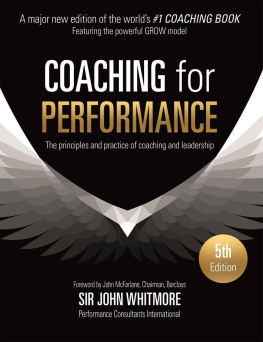
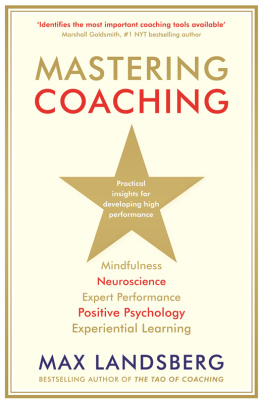
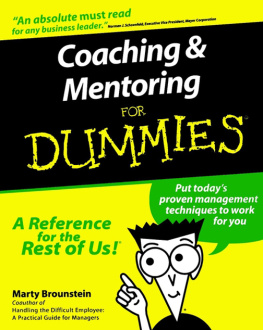
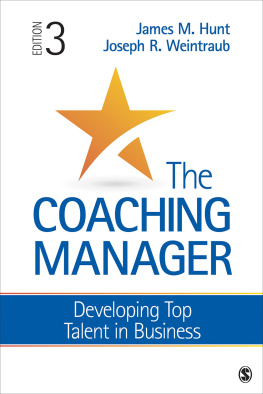



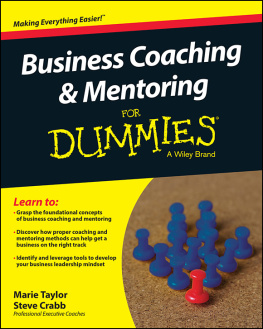



 1) To explain the role of manager as coach
1) To explain the role of manager as coach